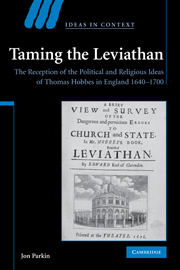 Taming the Leviathan
Taming the Leviathan Published online by Cambridge University Press: 05 May 2010
CONTEXT
In several accounts Hobbes gives the impression that he had been composing the English version of his political theory from the middle of 1646, but the bulk of the evidence suggests that he was actually working on De Corpore between 1646 and 1649. Hobbes appears to have started work on Leviathan in late 1649, putting aside the manuscript of De Corpore, which was nearly ready for publication. Hobbes's reasons for doing this are not entirely clear, but circumstantial evidence suggests that the reason might have been both political and controversial. Quentin Skinner's original thought that the new work was a contribution to the allegiance controversy fits chronologically with the debate over the engagement and theoretically with Hobbes's sharpened emphasis in Leviathan upon the conditional quality of obedience (specifically its relationship to protection). The problem comes in characterising Hobbes's relationship to this debate, particularly because the arguments speaking most directly to the question of allegiance are to be found in the short ‘Review and Conclusion’ that Hobbes added to the end of the work. Commentators have noted tensions between the argument in the body of the text and the political message contained in the ‘Review’, and this has generated considerable debate as to the extent to which Leviathan itself was genuinely a pièce d'occasion, and a contribution to the engagement controversy. It is a testimony to the open quality of Hobbes's work that the textual evidence has been used to support almost diametrically opposed but nevertheless plausible interpretations.
To save this book to your Kindle, first ensure [email protected] is added to your Approved Personal Document E-mail List under your Personal Document Settings on the Manage Your Content and Devices page of your Amazon account. Then enter the ‘name’ part of your Kindle email address below. Find out more about saving to your Kindle.
Note you can select to save to either the @free.kindle.com or @kindle.com variations. ‘@free.kindle.com’ emails are free but can only be saved to your device when it is connected to wi-fi. ‘@kindle.com’ emails can be delivered even when you are not connected to wi-fi, but note that service fees apply.
Find out more about the Kindle Personal Document Service.
To save content items to your account, please confirm that you agree to abide by our usage policies. If this is the first time you use this feature, you will be asked to authorise Cambridge Core to connect with your account. Find out more about saving content to Dropbox.
To save content items to your account, please confirm that you agree to abide by our usage policies. If this is the first time you use this feature, you will be asked to authorise Cambridge Core to connect with your account. Find out more about saving content to Google Drive.